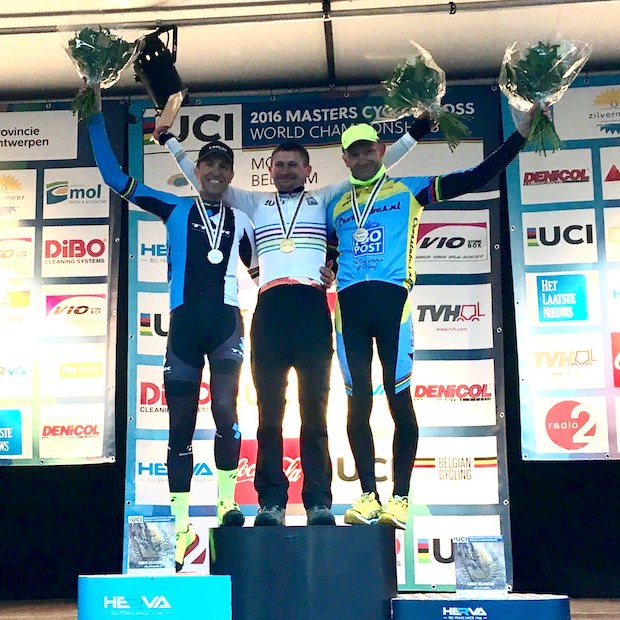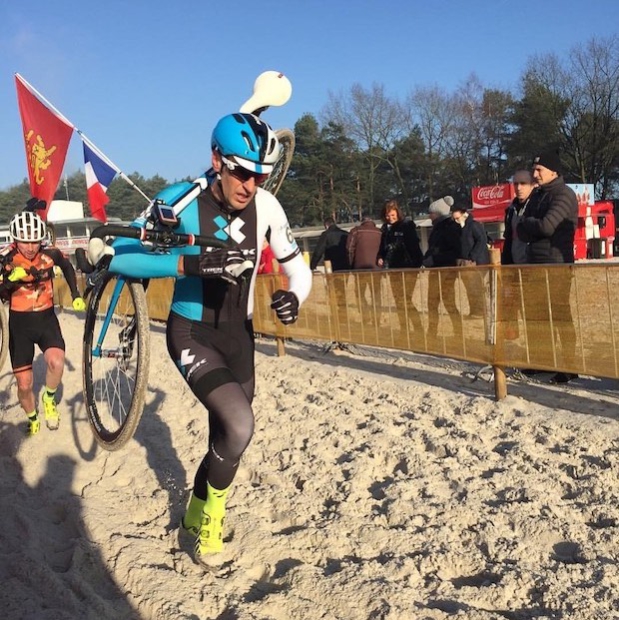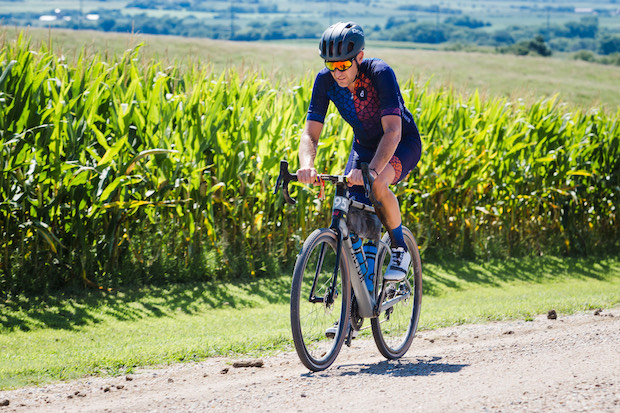CX Champ Mark Savery Redefines Cancer
If you have been around cyclocross and gravel racing for a while or raced mountain bikes in the 90s, you likely have heard Mark Savery’s name. If you ride a mountain bike with suspension, you likely regularly use a feature that Mark helped invent. Mark is a 2013 Masters Cyclocross World Champion and a silver medalist at the 2010 Gravel World Championships. Mark has been battling for podiums for more than 40 years. In June 2020, he began a new battle for his life against colorectal cancer that has metastasized to his liver.
Slowtwitch: Mark, those of us who race cyclocross are familiar with your master’s battles at UCI races, nationals, and worlds. But, for readers unfamiliar with your 40-year history as an endurance athlete, can you give us some of your memorable highlights?
Mark Savery: My cyclocross World Championships results are those that I’m most proud of, especially the two years I competed in Mol, Belgium. The course there is like nothing you can experience in the US. My first year there in 2016 really opened my eyes to what racing in Belgium required. I had a decent mid-grid call-up and I quickly joined the lead duo. However on the last lap the sand and running was a bit much so second place was the best I could do. The silver medal completed my set of gold-silver-bronze from Louisville 2012 and 2013.
Knowing what I was in for in 2017 I focused my entire season around training in the sand and running. It was kind of funny, the more I focused on Belgian specific training the worse my results in the US became. I came into the 2017 world championship knowing I was ready for anything the course could throw at me but little did I know it wasn’t the course I needed to worry about, it was the random start call-up. After registration I was gutted to find out I would be lining up second from last, 89th on the start grid. As the whistle blew I went all in riding the sand and running like I never had before. I would claw my way to 5th place eventually crossing the line exhausted in 6th. Although it wasn’t a podium it was one of the races I’m most proud of for fighting until the very end.

ST: Looking back on your Masters Cyclocross World Championship, what do you continue to carry with you today from that epic battle?
Mark: Just how cyclocross has so many variables that can either help you win or lose. It’s not just about your fitness, but you need excellent skills, a good strategy, a good pit crew and good preparation. That victory was as much as a win for my pit crew, Tom Price and Rafal Doloto, as it was for me. Without those guys and a great pre-race strategy I’d never have won that day.

ST: Early in your career, you were one of the innovators who were making mountain bikes more suited to the tracks on which you were racing. Can you tell us about your patent and how that invention came to be?
Mark: The 1990’s were an amazing time to be in the mountain bike industry. In 1997 Manitou launched our Twin Piston Chamber (TPC) suspension damper. It provided exceptional rebound and compression control. Our cross country athletes loved how supple and active the fork was while descending but felt like it was too supple for climbing and sprinting out of the saddle, especially on the extremely fast World Cup start loops.
We knew we needed to firm up the suspension somehow. After a morning brainstorm session I took our notebook scribbles into the machine shop and by late afternoon I had a working prototype. That evening I headed out to our cross country test track and the design worked as expected. We now had a compression damping assembly with a hydraulic lockout to prevent the fork from bobbing while sprinting or climbing out of the saddle, all with a simple turn of a knob all while still providing amazing control on fast technical descents.
We presented it to the athletes for use at the 1998 Cross Country World Cup in Napa, CA and they loved it.
ST: Most recently, you have helped bring Factor Bikes to the United States. Can you tell us about your history with Factor?
Mark: It all started when long time friend Jay Thomas took over distribution for the United States. At the time I was between jobs, so when Jay called I was really excited about the opportunity. Jay and I work really well together so it didn’t take long before we were moving the Factor warehouse to Nebraska where Jay and I are located and began building the brand in the United States.
ST: Your cancer diagnosis must have come as a real shock. I can’t even imagine what that’s like to get hit with that news. You and your wife, Anne, have been chronicling your cancer battle on Caring Bridge. Can you help us understand what mental shifts you had to make to transition from a focus on racing to battling cancer?
Mark: At the time of my diagnosis, I had kind of called it a career as a bike racer. I was focused on just riding for fun again and enjoying the bike without following a training program. I was also working with junior athletes and helping them achieve their cyclocross goals. The biggest mental shift really came down to how hard the cancer would knock me down. I was really looking forward to travelling in our camper van with Anne and our wheaten terrier Gus. Early on in my treatment we were able to get out for some trips but 2021 has been really difficult so we’ll see how this fall goes. I recently had colostomy surgery which should really help improve my quality of life.
ST: I have to think that your lifelong training as an endurance athlete is a major asset in your cancer battle. Can you give us some details on how you fight cancer as an athlete?
Mark: Being healthy and fit has definitely been a big help. In fact, my oncologist said my main focus should be exercising and eating enough to maintain my weight. My first two cycles of chemo went really well and I was able to keep riding, although it was really tough with my low red blood cell count but it was awesome just being able to ride.
That fighting spirit and high pain threshold can bite you in the ass though. Towards the end of my second cycle of chemo I pushed a little too hard and 9 months later I am still suffering with really bad neuropathy in my hands and feet.

ST: Mark, you have some amazing support around you to keep fighting. You are such a positive force in the endurance community for those you come into contact with in person and on social media including Instagram and Twitter.
Mark: Thank you. Going into this the last thing I wanted people to say was why Mark? My attitude was why not me. I have had such an amazing life and career with friends around the world. I really just hoped that my diagnosis would raise awareness in the community and other athletes would go out and get checked out instead of putting off that all important colonoscopy. Basically, don’t put it off like I did.
It’s been amazing because so many people have reached out and said I pushed them to get checked and they were clear. That really makes me happy that I can help others and their families.
ST: We want you to know that we are in your corner and want to support you. One way we can support you is to donate to your GoFundMe to assist with your medical bills. How else can we be a positive force in your life?
Mark: Thank you again. Really just spread the word about colorectal cancer and don’t put off getting your colonoscopy. Colon cancer if caught early is very survivable so it’s critical that us masters athletes gets checked early and regularly
You can also keep an eye on my Instagram as I’m working on a cool fundraiser collaboration jersey, and if you have friends fighting cancer and not letting it control their lives use the hashtag #redefinecancer because we’re in control, not the cancer.
ST: Thank you for your time, Mark. Keep up the good fight.
Mark: Cheers, and thank you for helping me spread the word.
Images 1 & 2: 2016 Masters 45-49 World Championships, Mol, Belgium, © Anne Savery
Image 3: 2019 Gravel World Championships, Nebraska




Start the discussion at forum.slowtwitch.com